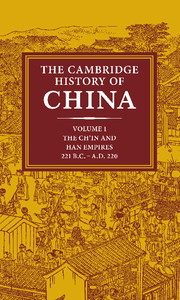Book contents
- Frontmatter
- Introduction
- 1 The state and empire of Ch'in
- 2 The Former Han dynasty
- 3 Wang Mang, the restoration of the Han dynasty, and Later Han
- 4 The conduct of government and the issues at stake A.D. 57–167
- 5 The fall of Han
- 6 Han foreign relations
- 7 The structure and practice of government
- 8 The institutions of Later Han
- 9 Ch'in and Han law
- 10 The economic and social history of Former Han
- 11 The economic and social history of Later Han
- 12 The religious and intellectual background
- 13 The concept of sovereignty
- 14 The development of the Confucian schools
- 15 Confucian, Legalist, and Taoist thought in Later Han
- 16 Philosophy and religion from Han to Sui
- Bibliography
- Glossary-Index
- Map 7 The Han empire, 143 b.c.
- Map 8 The Han empire, 108 b.c
- Map 9 The Han empire, a.d. 2
- Map 12 The Han empire, a.d. 140">
- References
15 - Confucian, Legalist, and Taoist thought in Later Han
Published online by Cambridge University Press: 28 March 2008
- Frontmatter
- Introduction
- 1 The state and empire of Ch'in
- 2 The Former Han dynasty
- 3 Wang Mang, the restoration of the Han dynasty, and Later Han
- 4 The conduct of government and the issues at stake A.D. 57–167
- 5 The fall of Han
- 6 Han foreign relations
- 7 The structure and practice of government
- 8 The institutions of Later Han
- 9 Ch'in and Han law
- 10 The economic and social history of Former Han
- 11 The economic and social history of Later Han
- 12 The religious and intellectual background
- 13 The concept of sovereignty
- 14 The development of the Confucian schools
- 15 Confucian, Legalist, and Taoist thought in Later Han
- 16 Philosophy and religion from Han to Sui
- Bibliography
- Glossary-Index
- Map 7 The Han empire, 143 b.c.
- Map 8 The Han empire, 108 b.c
- Map 9 The Han empire, a.d. 2
- Map 12 The Han empire, a.d. 140">
- References
Summary
Many thinkers in Later Han China were in a mood of disillusionment and bewilderment. They were dissatisfied with the social environment in which they found themselves; they considered the political, social, and economic practices of the time to be utterly corrupt. From their common Confucian background, these thinkers blamed the ruling regime for failing to curb the evil, and for failing to reform the affairs of the state; these were moral and political failings which they regarded as prime causes of other ills. Some of these thinkers went a step further and cast doubt on the prevailing Confucian doctrines, which for centuries had been the guiding principles of the state. Since these thinkers were nominal Confucians, their distress has been obscured by the so-called triumph of Confucianism in Han times, and by the highly conservative doctrine propagated by the Later Han court as the official Confucian orthodoxy. The tension between the official Confucian teaching as established in Former Han and its nonofficial critique arising in the Later Han not only evinces the diversity and complexity of Han Confucianism; it also marks an important change in the general intellectual trend from Former Han to Later Han.
With the fall of Later Han, the official Confucian orthodoxy perished. Much later it was denounced by the neo-Confucians as well as by many modern scholars as a vulgar mixture of Confucianism, Taoism, Legalism, and yin-yang and Five Elements cosmological thought. On the other hand, the criticism of this orthodoxy by Later Han thinkers has often been praised as being truly representative of the Confucian moral spirit.
- Type
- Chapter
- Information
- The Cambridge History of China , pp. 766 - 807Publisher: Cambridge University PressPrint publication year: 1986
References
- 2
- Cited by

